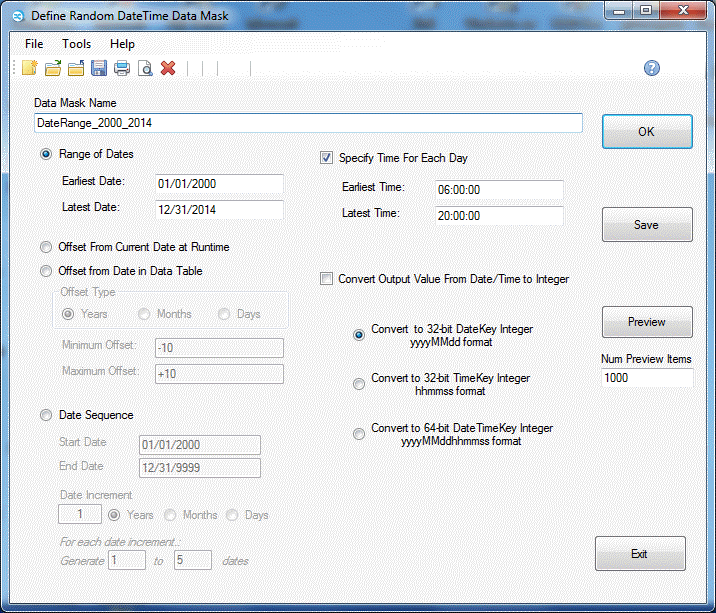Random Dates And Times
Random Dates And Times

Range of Dates
Select this option to generate a range of dates that will fall within the Earliest Date and Latest Date that you specify.
Offset From Current Date at Runtime
A random date that uses the Offset Type criteria you specify will be generated. Date will be offset from the current system date and time as determined at run-time.
Offset From Date in Data Table
A random date that uses the Offset Type criteria you specify will be generated. Date will be offset from the date in the data source field to which the random value is mapped.
Offset Type
Select whether the offset will be expressed as a difference in Years, Months or Days.
Minimum Offset
Maximum Offset
Random offset that is produced will be between the minimum and maximum offsets specified here. The offset number will refer to Years, Months or Days depending upon the Offset Type you select.
Offset Example:
Offset from Date in Date Table is selected.
Order Date field in data table is 5/15/2010.
Offset type is Days.
Minimum Offset is -5.
Maximum Offset is +5.
Random output dates will range from 5/10/2010 to 5/20/2010.
Date Sequence
Select this option to generate a sequence of dates that start at the Start Date and end with the End Date.
Date Increment
Specify the number of Years, Months or Days to add when generating the next date in the sequence.
For each date increment
Specify the minimum and maximum number of instances to generate of each date in the sequence.
Sequence Example:
Start Date = 1/1/2000
End Date = 12/31/2010
Date Increment = 1 Days
For each date increment = Generate 1 to 3 dates
Specify Time For Each Day is checked.
Output dates will look something like the following:

Specify Time For Each Day
Select this option if you want to generate a random time to include with each generated date.
Random times will range from Earliest Time to Latest Time.
Convert Output Value From Date/Time to Integer
Select this option to convert random date/time values to integer values that are formatted for use in a data warehousing scenario. Data warehouse tables frequently store dates as integers in yyyyMMdd format for speedier lookups and sorts.
Convert to 32-bit DateKey Integer
yyyyMMdd format
Example:
Date/Time = 1/1/2012 04:15:00 PM
Integer = 20120101
Convert to 32-bit TimeKey Integer
hhmmss format
Example:
Date/Time = 1/1/2012 04:15:00 PM
Integer = 161500
Convert to 64-bit DateTimeKey Integer
yyyyMMddhhmmss format
Example:
Date/Time = 1/1/2012 04:15:00 PM
Integer = 20120101161500